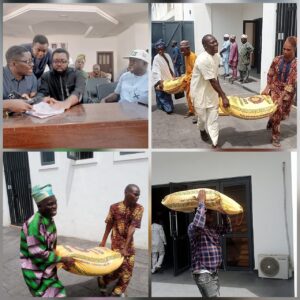
`Ewedu’ plantation during dry season is highly profitable — Expert
Dr Joel Akinfasoye, an agronomist at the National Horticultural Research Institute (NIHORT), Ibadan, says that the cultivation of `Ewedu’ (Corchorus Oletorious) ,especially, during dry season is a highly profitable venture.
Akinfasoye told newsmen on Friday in Ibadan that farmers should engage in the cultivation of `Ewedu’ because of its profitability.
The Head of Horticultural Consultancy and Venture Unit, NIHORT, said that `Ewedu’ farming and business could be a quick thriving one as the consumption of the vegetable is prominent in the country, especially, in the South-West.
He added that farmers would not have problems in marketing `Ewedu’ as the demand for it would always be on the increase due to its importance.
“Today, people are exporting `Ewedu’ to Europe while many African kitchens in the Diaspora cannot, but request for the vegetable.
“Some big supermarkets in Nigeria also do display the vegetable on their shelves.
“Its cultivation in the dry season is restricted to the valley bottom or river banks known as FADAMA (Hausa) or Akuro (Yoruba), it grows naturally on the farm during the rains, especially, in areas where it had been planted years back,’’ he said.
On the management of `Ewedu’ farms in dry season, the agronomist said that a good land preparation would be required.
He said that such land could be manually cleared, or tractorised if the land area is tractorisable.
According to him; all debris, stumps, stones and pebbles must be removed while it is important to make raised beds of about one metre wide, to any convenient length.
“Advantage of this is that the soil becomes loose for water percolation, aeration and easy penetration of the roots of the crop.
“The seeds are treated with heat either through hot water treatment or frying in a hot plate for a few minutes in order to break the dormancy.
“Rudiments of planting involve the mixing of the seeds with dry loose sand in a ratio of 1:10 and a shallow troup is made on the two side of the bed at 75cm.
“The mixture of sand and seed is drilled along the troup, after drilling there must be wetting of the farm and regular watering at least twice a week.
“After three weeks, the first harvest should be done, weeding should also be done as at when due,’’ he said.
Akinfasoye, however, urged the Federal Government to create farms either as FADAMA, assist farmers to prepare the land and provide all necessary inputs for them.
“Within a period of one month after planting the vegetable, revenue will be trickling in.
“This will certainly improve the livelihood of farmers, citizens and boost the national economy by extension,’’ he said.



